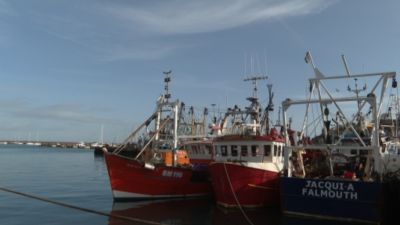What needs to change for the UK and EU to make a Brexit deal?

This is a crucial week in the Brexit negotiations. Now where have you heard that one before?
You know the script by now: both sides want a deal, progress has been made but significant obstacles remain, the EU must respect UK sovereignty, the UK must respect EU free market integrity.
Time, though, is now really (really) running out.
The transition period ends in just six weeks on December 31 and not only do both sides have to agree a deal before then but also get it ratified in both the UK and EU Parliaments.
November then is a critical month.
Ireland’s foreign minister Simon Coveney described this as “move week”, a deal still “very doable”, he said, but “very difficult”.
The UK’s chief negotiator David Frost and his team are meeting their EU counterparts in Brussels in an attempt to overcome what have been the same sticking points for months - fishing and the so-called level playing field (deciding which rules on state aid but also workers' rights and environmental standards the UK should follow after it leaves).
On his arrival in Brussels, Mr Frost tweeted that there “has been some progress in a positive direction in recent days...But we may not succeed.”
So what needs to change?
Fishing
It may be drop in the ocean economically but fishing is now perhaps the biggest obstacle threatening to sink these talks.
The UK is still bound by the EU’s Common Fisheries Policy (CFP) until it leaves on December 31.
The CFP is detested by the British fishing industry who believe the system of quotas introduced in the 1970s severely limits their ability to fish in UK waters.
They see Brexit as a chance to reverse that and take back control of who fishes in Britain’s bountiful waters.
The EU - particularly, but not exclusively, France and Spain - wants to maintain the status quo and continue to fish at the same rate in British waters even after Brexit.
The UK wants to be an independent coastal nation, deciding for itself who accesses its waters and negotiate fishing quotas each year with the EU, just as Norway currently does.
It is a point on which the EU has already accepted it will probably have to budge, Michel Barnier saying in June: “The EU wants the status quo, the UK wants to change everything...
"If we want an agreement we have to discuss somewhere in between these positions."
Talks however on this have barely progressed since the summer.
'Level playing field'
The EU wants to see movement from the UK in the negotiations on the so-called "level playing field".
In essence the level playing field refers to a set of rules used to stop businesses in one country (in this case the UK) undercutting businesses in another country (eg. the EU) on things such as state subsidies (the government intervening to help struggling industries), environmental and workers rights.
The EU wants to ensure trade with the UK is fair and competitive and believes a level playing field is a essential to avoiding tariffs.
It insists any trade deal must be accompanied by the UK adopting the EU's rules on subsidising businesses (state aid) or at the very least following rules similar to theirs.
The UK, however, does not want EU law to be the basis of establishing common standards or be under the jurisdiction of EU institutions.
Boris Johnson has said he’s not asking for special treatment - he just wants a basic free trade deal like other countries have with the EU.
The EU, however, says it’s not that simple because the UK is one of the world's biggest economies and unlike Canada, for instance, the UK is next door to the EU and already deeply integrated with European markets.
These aren’t the only stumbling blocks but unless they are overcome a deal won’t be possible.
No deal will mean the UK and the EU trading on less lucrative World Trade Organisation terms with tariffs and quotas, which would be economically damaging to both sides.
Neither side has given a hard deadline for reaching a deal which would avoid such tariffs and quotas but any deal not agreed in the next two weeks risks leaving too little time for both the UK and the EU parliaments to scrutinise and ratify.
The EU Parliament meets for the final time on December 16.
With talks now at crunch point, Downing Street has been quick to dismiss any suggestion that the UK could soften its stance in light of Dominic Cummings‘ departure.
Mr Cummings was until last week the PM’s chief advisor and was crucially the architect of the Vote Leave campaign.
Mr Johnson’s spokesperson said: “There will be no change in our approach.
"As David Frost set out over the weekend, we are working to get a deal but only one that is compatible with our sovereignty and takes back control of trade, our waters, and our borders.”
Chancellor optimistic about end of Brexit transition but fails to rule out chaos in the New Year
Economy surged out of recession in third quarter, but took another hit as second lockdown loomed